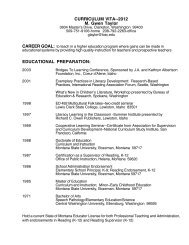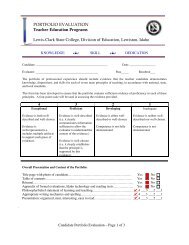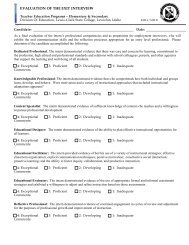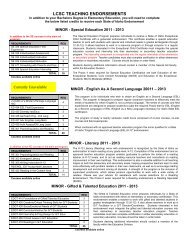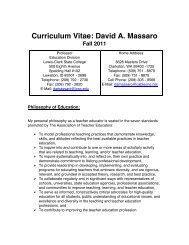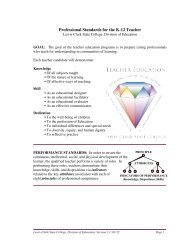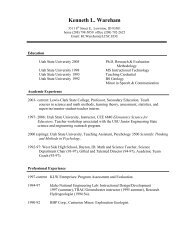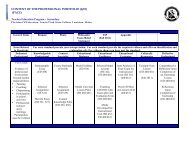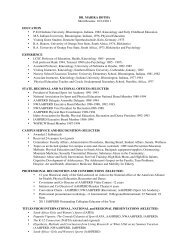• The teacher models effective communication strategies in conveying ideas and information and inasking questions (e.g. monitoring the effects of messages, restating ideas and drawing connections,using visual, aural, and kinesthetic cues, being sensitive to nonverbal cues given and received). (K,S)• The teacher supports and expands learner expression in speaking, writing, and other media. (K, S, D)• The teacher knows how to ask questions and stimulate discussion in different ways for particularpurposes, for example, probing for learner understanding, helping students articulate their ideas andthinking processes, promoting risk-taking and problem-solving, facilitating factual recall, encouragingconvergent and divergent thinking, stimulating curiosity, helping students to question. (K, S)4.The teacher uses an understanding of individual and group motivation and behavior to create a learningenvironment that encourages positive social interaction, active engagement in learning, and self-motivation andfosters active inquiry, collaboration, and supportive interaction in the classroom.• The teacher understands how participation, structure, and leadership promote democratic values in theclassroom and understands strategies that make students feel valued in the classroom and the community.(K, S)• The teacher understands how social groups function and influence individuals, and how individualsinfluence groups. (K, S)• The teacher understands the principles of human motivation and behavior, both extrinsic and intrinsic andrecognizes factors and situations that are likely to promote or diminish intrinsic motivation, and knows howto help students become self-motivated. (K, S, D)• The teacher respects students as individuals with differing personal and family backgrounds and variousskills, talents, and interests. (D)• The teacher makes students feel valued for their potential as people, and helps them learn to value eachother. (K, S, D)• The teacher recognizes the importance of leadership and understands how participation supportscommitment, and is committed to the expression and use of democratic values in the classroom. (K, S, D)• The teacher recognizes the value of intrinsic motivation to students’ lifelong growth and learning and iscommitted to the continuous development of individual students’ abilities and considers how differentstrategies encourage self-motivation. (K, S, D)• The teacher recognizes that plans must always be open to adjustment and revision based on student needsand changing circumstances. (K, D)• The teacher creates a learning community in which students assume responsibility for themselves and oneanother, participate in decision-making, work collaboratively and independently, and engage in purposefullearning activities. (K, S, D)• The teacher engages students in individual and cooperative learning activities that help them develop themotivation to achieve, by, for example, relating lessons to students' personal interests, allowing students tohave choices in their learning, and leading students to ask questions and pursue problems that aremeaningful to them. (K, S)• The teacher engages students in generating knowledge and testing hypotheses according to the methods ofinquiry and standards of evidence used in the discipline. (K, S)• The teacher helps the group to develop shared values and expectations for student interactions, academicdiscussions, and individual and group responsibility that create a positive classroom climate of openness,mutual respect, support, and inquiry. (K, S, D)• The teacher uses a range of effective classroom management strategies to promote positive relationships,cooperation, and purposeful learning in the classroom. (K, S)• The teacher exhibits a respectful regard for the needs and success of each student and acts as an advocatefor students. (K, S, D)• The teacher maintains a caring and supportive relationship with students with objectivity, fairness, andrespect. (K, S, D)• The teacher establishes a positive and safe climate in the classroom and participates in maintaining ahealthy environment in the school as a whole. (K, S, D)68
Demonstrating Skills as an <strong>Education</strong>al Facilitator:THE EDUCATIONAL EVALUATORThe Principle:The successful teacher is one who continually and accurately assesses the achievement of students and the efficacyof the learning environment.Key Attributes:The teacher understands and uses appropriate, formal and informal assessment strategies to evaluate and ensure thecontinuous intellectual, social and physical development of the learner. The teacher performs appropriate,comprehensive assessments of the processes of instructional design, facilitation, and evaluation. The teacher adjustsand refines instruction based upon informed analysis.Indicators of Performance:1. The teacher understands and uses appropriate, formal and informal assessment strategies to evaluate and ensurethe continuous intellectual, social and physical development of the learner.• The teacher understands the characteristics, design, purposes, uses, advantages, and limitations of differenttypes of assessments (e.g. criterion-referenced and norm-referenced instruments, traditional standardizedand performance-based tests, observation systems, and assessments of student work) for evaluating howstudents learn, what they know and are able to do, and what kinds of experiences will support their furthergrowth and development. (K)• The teacher knows how to select, construct and uses a variety of formal and informal assessmenttechniques (e.g. observation, portfolios of student work, teacher-made tests, performance tasks, projects,student self-assessments, peer assessment, and standardized tests) appropriate to the learning outcomes andto enhance her or his knowledge of learners, evaluate students' progress and performances, and modifyteaching and learning strategies. (K, S)• The teacher understands measurement theory and assessment-related issues, such as validity, reliability,bias, and scoring. (K)• The teacher understands the purposes of formative and summative assessment and evaluation. (K)• The teacher realizes the need to use multiple strategies to assess individual student progress. (K, D)• The teacher understands the role of assessment in designing and modifying instruction and the need forongoing assessment as essential to the instructional process. (K, S)• The teacher knows how to communicate assessment information and results to students, parents,colleagues, and others. (K, S)• The teacher understands and applies technology to facilitate effective assessment and evaluation strategies.(K, S)• The teacher is disposed to use students' strengths as a basis for growth, and their errors as an opportunityfor learning and is committed to using assessment strategies and communicating results to promote studentgrowth rather than limit student learning opportunities. (K, S, D)• The teacher respects the ethical issues related to assessment (e.g., confidentiality, labeling, and use ofassessment results). (K, D)• The teacher appreciates input from parents/guardians and others knowledgeable about the student. (D)• The teacher solicits and uses information about students' experiences, learning behavior, needs, andprogress from parents, other colleagues, and the students themselves. (S)69



